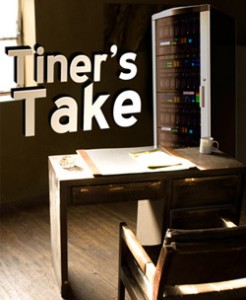Who’s Helping the Schools?
 In 2002, under the direction of then-Governor Angus King (now a U.S. Senator), the state of Maine started a 1:1 laptop initiative with its middle school students. In a nutshell, the MLTI (Maine Learning Technology Initiative) program funded the cost of laptops for all middle school students. An RFP was created and the winning bidder was Apple. For the past ten years Apple laptops have been in 100 percent of middle schools in the state of Maine. Three years ago, this program was expanded to include high schools in the state who chose to be part of the program and pay for the lease of the laptops. Needless to say, Maine’s public school are heavily invested in Apple computing.
In 2002, under the direction of then-Governor Angus King (now a U.S. Senator), the state of Maine started a 1:1 laptop initiative with its middle school students. In a nutshell, the MLTI (Maine Learning Technology Initiative) program funded the cost of laptops for all middle school students. An RFP was created and the winning bidder was Apple. For the past ten years Apple laptops have been in 100 percent of middle schools in the state of Maine. Three years ago, this program was expanded to include high schools in the state who chose to be part of the program and pay for the lease of the laptops. Needless to say, Maine’s public school are heavily invested in Apple computing.
Recently, the contract with Apple expired and a new RFP was issued. Our new governor, Paul LePage, and his administration made the choice of an HP ProBook 4440 as the preferred device. Governor LePage indicated this was his choice based on the fact that this was the lowest price solution and the equipment most students will see in the future workplace.
Educators around the state are rallying against this decision. They claim that this choice will require drastic new training of the teachers and the students, and cost more money in the long run. For example, all the IT departments, who have configured their networks (think print servers, etc.) to Apple computers, and have tools for troubleshooting and repairing Macs, now need to change those tools. They argue that the Governor and Department of Education have made a horrible decision that will effect the use of technology in schools.
Now, why am I writing about this in a publication dedicated to the AV Industry? Well, it’s because I think that much of what we see in Maine right now is due to the fact that our technology support in schools is understaffed, and the staff that does exist is intended to only be technicians and help desk support. Often, these staff are former school librarians or teachers.
I believe that these technical support people make decisions not based solely on the best interest of the users (students or teachers). I believe they are made to keep the machines running at an expected level, with an absolute minimum amount of work from the school technology people – i.e., the greatest good for the greatest number. This is why we see laptops with software that “locks” them down, or teachers being required to give back a laptop over the summer. That is not a slap at those people; it is simply because they are enormously under-staffed. Our local school district has about 1,400 students and about 300 employees. They have four technology support personnel (including the director) to take care of all needs across the district. That is about a 1:400 person support model.
What is drastically lacking in K-12 schools is long-range planning, opportunity to stay up to date with technologies, acceptance of experimentation and lack of monetary support for training of the technical support staff. What does all of this have to do with the MLTI project that I started this article writing about? It is my belief that it should not matter what type of device you give to students and faculty. It could be a Surface Tablet, iPad, MacBook Air or a HP laptop, the schools need to be in a place to easily adjust to these changes. Two years ago they needed to be in a place where they understood that this could happen. Even if the governor had stayed with an Apple product, but gone with the iPad, just as many changes would need to take place. Frankly, the schools got caught flat-footed.
If I were a consultant today, my mouth would be watering. There is such a huge market in the K-12 education sector for solid, thoughtful consultation. You could be the person who helps schools develop strategic technology plans for the future, with a real understanding that future. You could be the people who attend InfoComm, and then make a visit to the schools to share with them what you have seen. You could invite them to your shop to show them experiments with technology that you are working on. You could be the person who points them to information sources (like rAVe ED). In Maine today, you would be a hero if the school you had consulted with was ready to make the switch to HP easily.
What about money? Is there any money in consulting with K-12 schools, particularly in a small district in Maine? There can be, but you need to be smart and inclusive. The smart part is not walking into a central office and trying to sell the superintendent of schools. That is only going to make the technology people your enemy. How about you take the technology people out to a lunch and tell them what you can offer? At public school salaries, free lunch is a real treat. You also have to be smart with costs. Give a reasonable offer of service for a reasonable price. That means you cannot sell a school district with 1,400 students a technology plan for $10,000. They won’t buy it!
Inclusive means you need to cover the entire range of technology — from servers, to video, to web, to A/V to networking to security. Show them you are a full service option. You could make money by having creative contracts. For example, many school systems are still paying decent money for licenses to Microsoft or Apple for their word processing applications. Why? How about you develop a plan of support for them to move to Google Docs? Your fee, the cost of what they would have spent on licensing that software for two years. Likewise, MANY schools still use local email servers and calendaring apps. Again, switch them over to our friend Google and your fee is simply the money they save over the next two years on servers, software, etc.
I have various experiences in K-12 education over the years, from working in high school, to family members as educators to currently sitting on my local school board. There is no doubt in my mind that this area has ENORMOUS potential. It also has the potential to allow your business to do well, while doing good.
Have you had experiences in K-12 consulting that have been positive? Do you think this is an area of growth, or simply a black hole of support time? Let me know; I look forward to hearing from you.





